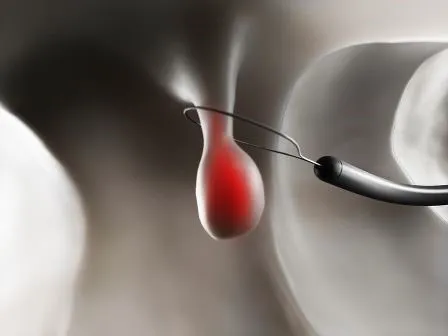Every unsuccessful attempt at conceiving can be devastating. It can cause severe stress and uncertainty. But why silently suffer when you can consult a fertility specialist for proper diagnosis and treatment?
Infertility affects more than 12% of women and several physical and hormonal causes exist. One such condition that may prevent pregnancy is endometrial polyps. It affects about 24% of females.
Dr. Nisarg Patel, one of the best IVF doctor in Ahmedabad, can help you determine if you have endometrial polyps and whether treatment can increase your chances of getting pregnant.
He is the Director of Nisha IVF Centre, a premier IVF hospital in Ahmedabad known for advanced personalized treatments at cost-effective prices.
Continue reading to learn how endometrial polyps can impact your fertility and what are the treatment options.
Before moving forward, let us understand what endometrial polyps are:
 Endometrial polyps, also called uterine polyps are benign fleshy growth of endometrial cells that appears on the uterus’ inner wall. There can be one or more polyps ranging from a few millimeters to several centimeters in size.
Endometrial polyps, also called uterine polyps are benign fleshy growth of endometrial cells that appears on the uterus’ inner wall. There can be one or more polyps ranging from a few millimeters to several centimeters in size.
They are a relatively common gynecological condition that can affect women of any age, but they are more prevalent in reproductive and postmenopausal women.
Endometrial polyps have been associated with varying estrogen levels brought on by conditions including high blood pressure and obesity.
Though mostly harmless, polyps can be a reason for your infertility. Visit Dr. Nisarg Patel, one of the best IVF doctor in Ahmedabad, for screening and treatment. He has helped thousands of couples conceive successfully.
Check out the symptoms of endometrial polyps:
Endometrial polyps can influence your menstrual cycle and make it more difficult for you to become pregnant, despite the fact that they are mostly not cancerous. Symptoms for females with endometrial polyps include:
- Irregular periods
- Spotting between menses
- Excessive bleeding during menses
- Difficulty in conceiving
- Miscarriage
As polyps normally do not show symptoms other than to influence your menstrual cycle and fertility, many cases go unnoticed until going to a fertility specialist for screening.
How do endometrial polyps affect fertility?
It has been discovered that polyps and infertility are related, albeit the cause is yet unknown. The polyps’ position might obstruct the embryo’s ability to implant in the uterus. These growths may also block the cervical canal and possibly hinder sperm from fertilizing the egg.
Furthermore, being a space-occupying growth, it may inhibit the embryo from implantation in the endometrium. Also, it is assumed that polyps cause inflammation in the uterine lining similar to the one caused by the intrauterine device, which could prevent the embryo from implanting properly.
Hysteroscopic polypectomy performed before in vitro fertilization (IVF) has increased the chances of conception. Moreover, the likelihood of a successful natural pregnancy increases when doctors choose to remove the polyps.
However, fertility treatments may not work if these endometrial polyps are not identified and properly managed.
How are endometrial polyps diagnosed?
The fertility specialist may ask you to undergo one or more of the following tests to diagnose endometrial polyps accurately:
- Imaging tests
- Saline infusion sonography
- Hysterosalpingography
- Hysteroscopy
- Endometrial biopsy
What are the treatments for endometrial polyps?
 Generally, the doctor will remove the endometrial polyps with hysteroscopic polypectomy. It is a minimally invasive outpatient procedure that is quick and painless.
Generally, the doctor will remove the endometrial polyps with hysteroscopic polypectomy. It is a minimally invasive outpatient procedure that is quick and painless.
During the procedure, the fertility specialist will insert a scope through the vagina into your uterine cavity to locate the precise position of the polyps.
The polyp is then extracted from the uterine wall using a tiny instrument passed through the hysteroscope. Using the scope lowers the possibility of damaging the surrounding healthy tissue while removing the polyp.
However, if the endometrial polyps are accidentally discovered during IVF treatment, the fertility doctor will freeze the embryos to be transferred later after the hysteroscopic polypectomy.
It takes around a month for the endometrium to regrow after the procedure. The frozen embryos can be transplanted within 120 days after the excision and are known to give good results.
Dr. Nisarg Patel, one of the best IVF doctor in Ahmedabad, says the extended delay could allow polyps to return, a common occurrence in some patients.
Pre- and post-surgical care
Women having endometrial polyps removed must always follow the doctor’s advice. This involves discontinuing some drugs, giving up smoking, and abstaining from alcohol before surgery.
After surgery, expect some cramping and mild vaginal bleeding. Pay close attention to the doctor’s guidelines, which may include not exercising, lifting, or engaging in sexual activity.
Although endometrial polyps in women of reproductive age are rarely malignant, they are sent to the lab for examination after removal.
After the hysteroscopic polypectomy, the patient can leave the hospital and return home the same day. A month later, she can start trying to get pregnant.
Conclusion
Consult a fertility specialist if you or someone you know is struggling with unexplained infertility. You can make an appointment at one of the best IVF hospital in Ahmedabad, Nisha IVF Centre, for comprehensive and compassionate fertility treatments under highly trained and experienced fertility specialists.


